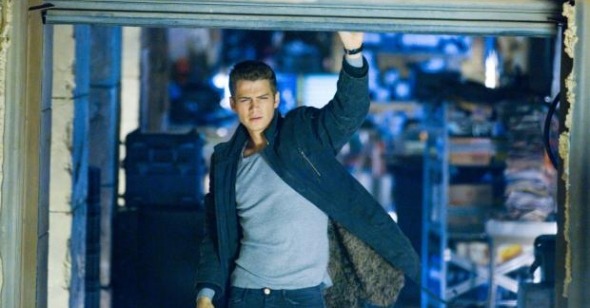Port-a-Potty
By Matt Connolly
Jumper
Dir. Doug Liman, U.S., Twentieth Century Fox
David Rice, the protagonist at the center of Doug Liman’s Jumper, possesses the mysterious ability to teleport anywhere at whim. We quickly discover, however, that he exploits his limitless potential for decidedly narrow purposes. Funding a life of luxury through periodic bank robberies (he zaps in and takes what he wants, leaving half-sincere promissory notes to pay it back one day), David spends his days “jumping” to various exotic locales and sampling the regional delicacies, whether they be material, sexual, or culinary. Even when bumming around his deluxe apartment, David won’t let the laws of time and space pop his slacker bubble. Why traverse the eight feet from to the kitchen when you can teleport there instead? Later, when he reaches for the remote control lying just beyond his grasp, we hardly even need the subsequent shot of David beaming six inches to the right to grab it. Superhuman prowess serves twentysomething languor: with great power comes maximum convenience. Such moments point to the shrewd, playful movie that might have been.
David’s easygoing existence is disrupted by the appearance of Roland (Samuel L. Jackson), a somber fanatic with bleached blonde hair and a singular mission to kill David and other “jumpers” like him. Roland, a member of a shadowy group simply titled the Paladins, repeatedly hisses his murderous reasoning throughout the film: “Only God should have the power to be in all places at all times.” Perhaps divine intervention would be better used to resuscitate Jackson’s career; the silky voiced menace he once brought to throwaway villain roles has long since devolved into bloodless check-cashing shtick.
On the run from Roland, David returns to his hometown of Ann Arbor, Michigan. He reconnects with his middle-school crush, Millie (Rachel Bilson), whom he convinces to accompany him on a trip to Rome (the film misses a potentially wonderful sight gag in not showing instant-gratification David, in an effort to keep his powers secret, squirming through the lengthy plane ride with Millie). As Millie and David fall into romance while sneaking around the Colosseum, Jumper adds another jumper to the mix: the embittered Griffin (Jamie Bell), who tracks and eventually teams with David to combat Roland and his minions.
The ensuing series of attacks, explosions, and quippy one-liners proceed with a dispiriting lack of verve and visual wit, a particularly acute disappointment given Liman’s track record for enlivening even mediocre material. I can’t remember a single scene from Mr. and Mrs. Smith, but Liman invested Brad Pitt and Angelina Jolie’s “he-shoots-she-shoots” romantic rivalry with such goofy, trashy pluck that it hardly matters. Jumper lacks that film’s throwaway kick, but it never provides a legitimate reason to take it seriously either. The intricacies of the jumpers’ powers and their connection to the Paladins both remain opaque at best, denying us access to an immersive and fully conceived science fiction universe (the script, co-written by David S. Goyer, Jim Uhls, and Simon Kinberg, is based on a novel by Steven Gould). Such a move seems particularly obtuse given the film’s sequel-baiting final moments.
The character of David is sketched in similarly vague terms. A coolly self-serving smooth operator with some serious ’rent issues (Mom left when he was five; Dad zones out to televised fishing), David radiates all the negative qualities attached to roguish action heroes with none of the alleviating charm and vulnerability. And the casting sure doesn’t help. I’ve been a Hayden Christensen apologist ever since his wormy, squirmy turn as sycophantic fabricator Stephen Glass in Billy Ray’s terrific Shattered Glass; freed from the hollow solemnity of the Star Wars films, Christensen explored Glass’s oily, lie-a-minute thought process with fascinating precision. Again asked to carry a leaden action flick, Christensen largely falls back on moody posturing that reads as more petulant than charismatic.
Still, the blame ultimately resides with Liman, whose unimaginative handling of admittedly dumb material is never more apparent than in the moments that should thrill us most. David zaps atop Big Ben, the Great Pyramids of Giza, and other eye-popping international destinations throughout the movie, but Liman films these ostensibly sweeping images in dutiful tracking shots that showcase the digitized landscape without conveying its grandeur. The filmmakers seem to have adopted David’s listlessness as a mandate, refusing to explore any of the intriguing avenues its chief conceit presents. Like David beaming across the couch to more effectively vegetate in front of the tube, the film elides the means to achieve its lethargic end.
For all its location-hopping, a numbing visual sameness infects the movie. The climatic confrontation between David and Griffin over a remote detonator (the details don’t matter) becomes an all-too-clear reminder that vapidity moves unencumbered by geographic limitation, or even the space-time continuum itself. It’s possible that a more generous reading of Jumper may find in its very lack of personality or energy an incisive critique of cultural homogenization in a globalized age David Rice and his ilk may just point the way to a new brand of transnational quotidian: blandness without borders.
